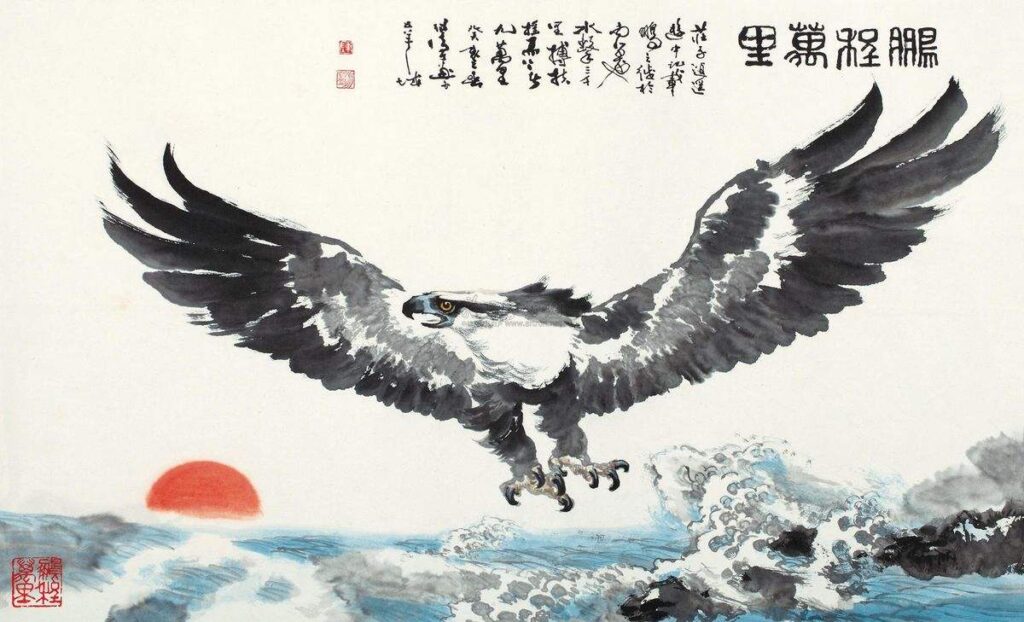“Floating is the ability is to avoid getting locked in any one position or tending in any particular direction. It means to be in constant motion, susceptible to the ebb and flow of respiration, without incurring expense or risking resistance of any kind. The word ‘float’ negates all thought of a destination and therefore cancels out any idea of finality, thus contradicting better than any other word the aspiration to and quest for happiness. It expresses better than any other the maintenance and nourishment of the vital” (François Jullien – Vital Nourishment – Departing from Happiness Chapter 9).
Zhuangzi wrote: “Do not be an initiator of [for] happiness, do not be an introducer of [for] unhappiness.” Yet, this is precisely what Aristotle, Zhuangzi’s contemporary, did in the West when he “conceived of happiness in terms of man’s proper function and therefore in relation to his highest capacity, reason.” In time, this notion became so deeply embedded that it is no longer perceived as a “cultural choice” that was, at least in part, based on the structure of the Greek language. Happiness as a goal introduced not just its opposite – unhappiness – but, more significantly, it launched the notion of a goal (telos), i.e., the principle of finality. In contrast, not only did China “show little interest in happiness,” but, as Jullien explains, Chinese thought barely developed an idea of finality,” and Classical Chinese did not even have a word for “goal.” “In place of the Greek preoccupation with telos and finality,” he writes, “Chinese thought emphasized what I have called being in phase, with success measured not by conformity to some aim but rather by the capacity to induce forgetfulness. A shoe is adequate if it makes us forget the foot. A belt is adequate if it makes us forget the waist … (for details, see page titled “Exempt from Happiness”). Even though the dao is usually translated as “the way,“ it should not be understood as a way “leading” to (truth or wisdom) and the metaphor used by Zhuangzi is that of “fish in a pond,” humans being described as swimming in “this milieu of endless movement, going around and around as easily as “fish in water.” Since reality itself is “change,” there is no need to introduce finality in order to generate activity: “Once we have given up goals and the burdens that go along with them, life itself decides how it will go … The mistake … is to remain “attached … Only when an effect is not sought can it flow in all its fullness … We must not cling to carefree idleness if we wish to enjoy a happy insouciance.”
“The ‘floating’ word admirably expresses [the] ability to avoid focusing on any goal so as to allow ourselves to be borne along by never ending effect
The word used by English speaking scholars is generally “flow” rather than “float,” but “float” goes further into erasing any sense of destination. “To flow” implies a direction, “to float” only indicates that one does not sink. Jullien writes: “Floating is the ability is to avoid getting locked in any one position or tending in any particular direction. It means to be in constant motion, susceptible to the ebb and flow of respiration, without incurring expense or risking resistance of any kind. The word ‘float’ negates all thought of a destination and therefore cancels out any idea of finality, thus contradicting better than any other word the aspiration to and quest for happiness. It expresses better than any other the maintenance and nourishment of the vital. To float is to designate no port and set no goal, while maintaining oneself in an emergent state – alert and unencumbered … It is not the vagueness of hesitation, ambivalence, or drift (or the adventurous intoxication of the unguided, as Rimbaud would have it). Boats that float easily at anchor in a bay undulate with the waves and can animate a landscape … ‘To float’ is … to move and to change at the world’s behest: ‘The nature of water is such that when it is not troubled, it is clear, and when it is not moving, it is flat; but when it is held back and does not flow, it can no longer be clear … There is neither precipitation nor stagnation, and if there is no tending toward anything, there is no holding back. Clarity, whether in water or in the realm of the vital, comes from calm flow and ease of passage, from movement that is unforced as well as unimpeded. It comes from fluidity alone. ‘There is movement, but along a natural (“celestial”) course, and this is the way to feed one’s spiritual dimension (yang shen)’. Here, of course, ‘spirit’ does not mean an entity opposed to the body but refers to an endless unfolding of one’s abilities by way of refinement … Tension comes from having a goal: by relinquishing this goal and the tension that comes from striving to achieve it, we open ourselves to the flow of the vital, which constantly clears and purifies, stimulating and replenishing life.”
But, how are we to understand “adequacy” if there is no goal?
Once again, Jullien turns to Zhuangzi: “A passage in the Zhuangzi puts us on the right track by rejecting the answer we expect: ‘He regrets nothing when he goes too far; when he performs adequately, he takes no credit’.” We expected the opposite, didn’t we? In fact, some commentators misinterpreted the passage, thinking that “the sage must perform adequately in every situation … But other commentators encourage a more literal interpretation: if the sage has no regrets when he goes too far (and does not congratulate himself when he hits the mark), it is because he has no aim of his own, and hence no opportunity to seize it, and is therefore in no danger of failing to do so … the adequacy/inadequacy distinction no longer holds, not because he transcends it but because it no longer makes sense. Since he is ‘floating’, he is no longer responsible for whether he hits the target or not, so he no longer deserves blame or credit. All he does is respond to the incitements that move him, and since these come from the world’s flux and play a role in its replenishment, there is no longer any reason to ask whether they are justified.”
With the extinction of all autonomy, “responsibility and loss are no longer possible”
At first sight, such a statement sounds rather unwise, it not outright dangerous. What is meant here is that when we, as it were, become the whole, we cannot “feel responsible” as individuals. Jullien here refers to Zhuangzi’s phrasing of “hiding the whole world in the whole world.”
“Leave a boat in a ravine or a mountain in a valley: one can then say that it is in a safe place. Yet a strong enough person could still come in the dead of night and carry [it] off on his back without attracting the attention of those who are asleep. When the small is placed in the large [or the small as well as the large”], it fits, and yet still it may be lost. But when the whole world is placed in the whole world, so that [it] cannot escape, all the conditions of an unchanging reality are met” (Zhuangzi).
“The sage evolves at a level where nothing can escape and everything exists.”
What strikes me in this statement is that what Western philosophy would refer to as the “nonduality of duality and non-duality” and traditional Buddhism refers to as sunyata – all things are empty – Daoism, instead, says “everything exists.” Yet, there is no contradiction: in East Asia, emptiness is approached from the side of phenomena, not as an ultimate metaphysical entity behind all things. So, stating that all things “exist” means “all things are existentially “real” as empty phenomena, phenomena being defined as transcient actualisations of emptiness.
Jullien explains: “The sage evolves at a level where nothing can escape and everything exists.” He “‘finds good in early death’ as well as ‘in death in old age.’ He appreciates the beginning as well as the end and experiences no sense of lack or failure. Wisdom consists in expanding the range of things where distinctions between adequacy and inadequacy and between happiness and its opposite no longer apply, so that the whole world appears as a process ‘involving’ countless transformations that have no end’.” Within a Christian context, this would count as a mystical union with God. But there is no reference to a world beyond this world in Daoism. So, Jullien contends, ‘to express what we are calling the ‘constancy’ of countless transformations, it is better to rely on a certain alternating parallelism of expression which imitates the motion of a transition without beginning or end, eschewing both the enigma of the beginning and the drama of the end: ‘Encountering, he does not oppose; surpassing, he does not hold on’” (Zhuangzi). The sage welcomes but does not cling. These phrases artfully express the avoidance of two extremes, saturation and exhaustion, each leading inevitably to the other, wherein lies the source of the tragic. So long as transition sustains itself without flagging, life persists in the endless flow: ‘He takes in without filling himself; he draws out without emptying himself’.”
Source:
François Jullien – Vital Nourishment, Departing from Happiness (2007)

